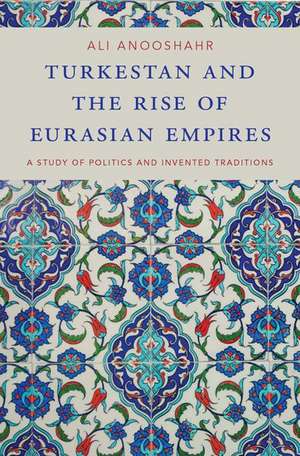Turkestan and the Rise of Eurasian Empires: A Study of Politics and Invented Traditions
Autor Ali Anooshahren Limba Engleză Hardback – 10 mai 2018
| Toate formatele și edițiile | Preț | Express |
|---|---|---|
| Paperback (1) | 182.75 lei 31-37 zile | |
| Oxford University Press – 22 sep 2020 | 182.75 lei 31-37 zile | |
| Hardback (1) | 533.32 lei 31-37 zile | |
| Oxford University Press – 10 mai 2018 | 533.32 lei 31-37 zile |
Preț: 533.32 lei
Preț vechi: 713.97 lei
-25% Nou
Puncte Express: 800
Preț estimativ în valută:
102.05€ • 105.28$ • 85.16£
102.05€ • 105.28$ • 85.16£
Carte tipărită la comandă
Livrare economică 15-21 martie
Preluare comenzi: 021 569.72.76
Specificații
ISBN-13: 9780190693565
ISBN-10: 0190693568
Pagini: 220
Dimensiuni: 239 x 157 x 23 mm
Greutate: 0.48 kg
Editura: Oxford University Press
Colecția OUP USA
Locul publicării:New York, United States
ISBN-10: 0190693568
Pagini: 220
Dimensiuni: 239 x 157 x 23 mm
Greutate: 0.48 kg
Editura: Oxford University Press
Colecția OUP USA
Locul publicării:New York, United States
Recenzii
In all, this is an important book, very readable, thought-provoking, full of new insights.
The book offers an extremely original and stimulating approach to the history of early modern Islamic empires, with a strong and convincing argument about the constructed nature of the official historiography of these empires. Anooshahr should be commended for the geographic and cultural breadth of this work, as well as the sophistication with which he explores a very difficult set of texts that, to my knowledge, have never before been put into conversation with one another.
In this closely argued study, Ali Anooshahr examines a wide range of Persian works composed in the fifteenth and early sixteenth centuries, a time of massive socio-political upheaval from the Balkans to Delhi. As older political orders gave way to new ones, how did the literati producing these works position their political masters-reigning sovereigns, upstart warlords, would-be rulers-vis-à-vis their past? Since that past was itself unstable and contested, Anooshahr shows how it had to manipulated, or even 'invented,' by different chroniclers. This book will be of great interest to students of Islamic history, the Persianate world, historiography, rhetoric, and the history of memory.
This is an important book, offering new readings of relatively well-known Persian texts and readings for the first time of others. Anooshahr brings new insights and new arguments into the study of early modern Muslim empires, focusing in particular on intellectual history and the problem of legitimizing new regimes. It is a book which all those studying early modern Muslim empires will not be able to ignore.
the book demonstrates the same thorough expertise in the field of Persianate historical writing that characterizes his earlier work. He offers fresh readings of many of the texts he deals with, many well-known in the field, and demonstrates the value of such readings by providing new insights and drawing new information from these texts. Turkestan and the Rise of Eurasian Empires is a readable and very thought-provoking study and Anooshahr makes a strong case for his argument. Furthermore, he demonstrates the immense potential of comparative research on Persianate historical writing, research that should be conducted far more frequently in the future.
The book offers an extremely original and stimulating approach to the history of early modern Islamic empires, with a strong and convincing argument about the constructed nature of the official historiography of these empires. Anooshahr should be commended for the geographic and cultural breadth of this work, as well as the sophistication with which he explores a very difficult set of texts that, to my knowledge, have never before been put into conversation with one another.
In this closely argued study, Ali Anooshahr examines a wide range of Persian works composed in the fifteenth and early sixteenth centuries, a time of massive socio-political upheaval from the Balkans to Delhi. As older political orders gave way to new ones, how did the literati producing these works position their political masters-reigning sovereigns, upstart warlords, would-be rulers-vis-à-vis their past? Since that past was itself unstable and contested, Anooshahr shows how it had to manipulated, or even 'invented,' by different chroniclers. This book will be of great interest to students of Islamic history, the Persianate world, historiography, rhetoric, and the history of memory.
This is an important book, offering new readings of relatively well-known Persian texts and readings for the first time of others. Anooshahr brings new insights and new arguments into the study of early modern Muslim empires, focusing in particular on intellectual history and the problem of legitimizing new regimes. It is a book which all those studying early modern Muslim empires will not be able to ignore.
the book demonstrates the same thorough expertise in the field of Persianate historical writing that characterizes his earlier work. He offers fresh readings of many of the texts he deals with, many well-known in the field, and demonstrates the value of such readings by providing new insights and drawing new information from these texts. Turkestan and the Rise of Eurasian Empires is a readable and very thought-provoking study and Anooshahr makes a strong case for his argument. Furthermore, he demonstrates the immense potential of comparative research on Persianate historical writing, research that should be conducted far more frequently in the future.
Notă biografică
Ali Anooshahr is an Associate Professor of History at the University of California, Davis. He is a scholar of Islamic Empires and focuses particularly on the transmissions of texts and individuals along networks that connected India, Iran, Central Asia, and the Ottoman Empire.
